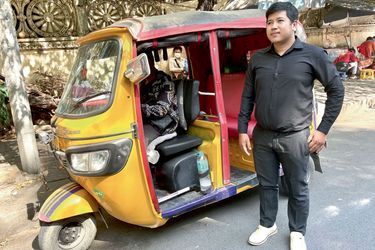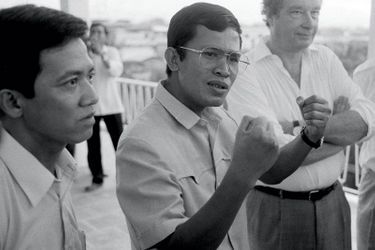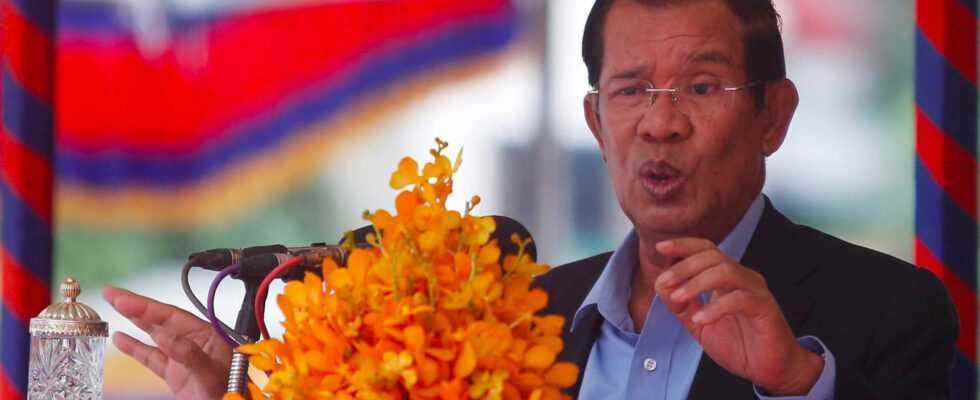After the nightmare of the Khmer Rouge, the country was cut off by Hun Sen. Forty years of terror and corruption.
A rattle-voiced ectoplasm who only lights up a room when he leaves. A rotten, in the first sense of the term, namely altered by decomposition. In a chic canteen in Phnom Penh, on the peaceful banks of the Tonlé Sap, when the scorching heat of the day gives way to an evening coolness, speech is free. And the jokes fly low. This evening, there are half a dozen “Aek Oudom” (“excellences”), the elite who have taken control of Cambodia, noisily discussing great wines. These gentlemen are smoking a Havana with a nice circumference. The ladies share the profiteroles. Outside hums a Rolls-Royce Phantom worth 150 years average Cambodian salary. In the nearby eateries, the little people feast on rice soup accompanied by salted eggs and fillets of catfish.
Thirty-seven years of absolute power
At the table next to ours, the discussion ignites. It speaks loudly, it gets carried away. But all agree on one fact: “Enough is enough. It is urgent to take action. The object of their ire: the one who speaks of himself only in the third person and is called “His Height” or, in Khmer in the text, “Samdech Akka Moha Sena Padei Techo” (“Exalted, glorious Lord , Supreme and Mighty Commander”). At 69, Hun Sen, the son of a peasant, a Khmer Rouge apostate then an officer in the Vietnamese People’s Army, is one of the oldest active tyrants on the planet: thirty-seven years of absolute power at the reins of Cambodia, of which he is remained the Prime Minister with stuffed ballot boxes and pronunciamientos. With the Cameroonian Paul Biya, forty years in power, or the Equatorial Guinean Teodoro Obiang Nguema Mbasogo, forty-two years of reign, Hun Sen holds, apart from royal families, the record for longevity at the head of a state.
Eldest son and presumed dolphin, Hun Manet (right), 44, on June 18, 2020 in Phnom Penh. He is already head of the army and counter-terrorism.
© Heng Sinith/AP/SIPA
The straw that broke the camel ? The announcement, at the beginning of 2022, that his 44-year-old son, the plump and pale Hun Manet, would succeed him to lead the country – even if it is rumored that the patriarch would consider extending his lease until 2028. His party has just won the municipal elections hands down, claiming 80% of the municipalities. Five years ago, the opposition had the bad idea to win 45% of the vote, which had earned the parties their deregistration and the imprisonment of the main leaders.

Kung Raiya, candidate of the opposition La Chandelle party. He was imprisoned for two years for his criticism of power on social networks.
© DR
In three decades, Hun Sen’s entourage has taken control of entire sectors of the economy. A 2016 study by the NGO Global Witness estimates that his clan, a family of 21 members, has monopolized the import-export, tourism, hotel, media, transport, real estate, energy and gambling. The Naga alone, the only casino in Phnom Penh, would bring in the clan around a hundred million euros a year. “The people have had enough. He is terrified but is only waiting for one thing: for leaders to emerge and guide them”, says, in a discreet place in Phnom Penh, Kung Raiya, 33, unsuccessful candidate of the new opposition party, La Chandelle, to the municipal elections in June. “Normally, in my province of Kampong Cham, I would be elected with 70% of the vote. There, with organized cheating, I was sure to lose”, continues this son of peasants who has already spent two years in prison for activism “in appalling conditions”: “We were 30 in 4 square meters! With me, rapists, killers, child murderers. No bed. Just a hole for the needs. »

1990. In power for five years, he receives in Phnom Penh the French Thierry de Beaucé, Secretary of State in charge of International Cultural Relations in the Rocard government.
© Benoît GYSEMBERGH/PARISMATCH
Reborn, the opposition was rolled, crushed, scattered like a puzzle. In 2018, during the last legislative elections, between two distributions of banknotes to textile workers, Hun Sen urged his detractors to “prepare their coffin”. “There are only three ways to oppose Hun Sen: prison, death or exile”, explains Sam Rainsy, former Minister of the Economy and herald of protest, crossed in Paris. “I knew jails, came close to death when a grenade attack killed 16 of my supporters in 1997, and, weary of the struggle, chose exile,” he concludes. Every Friday, like the Argentinian “madwomen of May”, the wives of political prisoners demonstrate in front of the American embassy.
Hun Sen’s two goals: to be loved like a brother and feared like the plague
To understand how Hun Sen put an entire country under his control, you have to go back in time. Cambodia, 1975. The Khmer Rouge took power and imposed Angkar. This ultra-Maoist dogma will carry away between 1.5 and 2.2 million people, out of a population of 8 million. It rests on simple postulates: “The reign of the people you will observe. Against any enemy, with courage you will fight, ready for all sacrifices, including that of your life for the people, the workers and the peasants. Courageous but not reckless, Hun Sen, who has already been injured five times, who lost an eye in the fire and who at the age of 25 leads a Khmer Rouge military region, feels the tide is turning. He deserted in 1977, joined the Vietnamese army, participated in the liberation of Cambodia and became, at the age of 26, Minister of Foreign Affairs. Like a Machiavelli prince, Hun Sen will tackle two objectives: to be loved like a brother and feared like the plague. Appointed Prime Minister in 1985, he will no longer leave power. Charming, clever but capable of black anger, the tyrant likes rivers and soporific speeches, Fidel Castro style. “Agricultural shows, speeches to the armed forces, inauguration of school complexes in his name, he has long built his legitimacy in the countryside”, testifies the Australian writer Sebastian Strangio, author of a book published in 2014, “Cambodia: from Pol Pot to Hun Sen and beyond”.
Greatly paranoid, Hun Sen has his dishes tasted, travels in an armored car and lives entrenched in Ta Khmau, in a bunker in the outer suburbs of Phnom Penh, watched over by a praetorian guard of 4,000 men and nicknamed “the den of the tiger”. In terms of private life, the master of Cambodia is credited with many conquests, even if sharing his bed is perilous. In 1999, his lover, artist Pisith Pilika, was shot three times in the back in the city center on the orders of Hun Sen’s wife, Bun Rany.
Half of the population lives on less than 130 euros per month
In 2022, Autocrat’s popularity is plummeting. Under his reign, Cambodia became, along with India, the most unequal country in the world. Half of the population, nearly 8 million people, live on less than 130 euros per month. Children in rags, pestilential smells, methamphetamine sellers with bulging eyes, swarms of rats: at night, the streets of Phnom Penh ooze misery and insecurity while in fashionable bars and clubs, Oscar, Pontoon or Epic Club , the golden youth parade in Gucci and have Veuve Clicquot magnums delivered by sedan chair. Royalty no longer plays its role of counter-power. The monarch, Norodom Sihamoni, a former ballet dancer, is under the orders of the Prime Minister. He only appears at Hun Sen’s pleasure. The extremely sophisticated system of corruption trickles down from the highest levels of the army and the state down to the village chiefs. A year before the construction of the new airport, people close to those in power bought land at one dollar per square meter, resold for 1,000 dollars per square meter after a few months.
Hun Sen feels all the more invulnerable as, in recent years, he has drawn closer to a formidable ally, China. France, a colonial power from 1863 to 1953, and which still grants it substantial development aid, is neglected, relegated to cooperation related to health and cultural events, such as the Printemps des Poètes. In Phnom Penh, some sixty 30-storey apartment towers, Babel of glass and steel, copies of Haussmann buildings and even a replica of the Arc de Triomphe, all three-quarters empty today, are emerged from the ground by the grace of Chinese promoters. In total, China accounts for 41% of foreign investment and 50% of Cambodia’s foreign debt. For 20,000 euros, a Chinese businessman can afford a Cambodian passport. For 100,000 euros, he can acquire a title and the stripes of general of the royal army, with the inherent privileges.
In 2020, Cambodia implemented a “Chinese-style” Internet monitoring and surveillance system
Protected by Xi Jinping, Hun Sen took the opportunity to finally settle his score with democracy. He made his own the maxim of Pol Pot, the leader of the Khmer Rouge genocide: “Better an innocent dead than a living enemy. In 2020, Cambodia implemented a “Chinese-style” Internet monitoring and surveillance system. The authors of anti-regime satirical songs are arrested without warning, such as rapper Kea Sokun, who asserts in his verses: “I was born in a country of misery. / […] I am opposed to dictator and oppression. / […] By singing, I want to help the nation. “I have no regrets,” assures us Kea Sokun, immaculate T-shirt and krama, traditional scarf, met out of sight of spies. “I have been accused of incitement to felony. I was urged to apologize, to denounce my friends in order to benefit from a remission. I refused. I will not stop singing my compositions, which speak of my country. Voices must be raised. His hit “Khmer Land” has been viewed over 26 million times.
Also read. Cambodia: foreigners in their country
In front of the anti-corruption unit he created, Hun Sen only declares a salary of 1,000 euros per month. But he sports a 2.5 million euro Patek Philippe Sky Moon Tourbillon on his wrist… He has only one obsession left: to avoid an end à la Robert Mugabe, the leader of Zimbabwe, weighed down by senility and deposed in 2017. At the head of a country where people under 30 represent 70% of the population, Hun Sen has just commissioned the production of a series entitled “The Son of the Full Moon”. Dedicated to his life, it will be broadcast on Bayon TV, a channel controlled by his daughter Hun Mana. In 2017, China had already awarded him the Confucius Peace Prize. An award given by a sympathetic jury made up of a colonel from the people’s army, a journalist from the “People’s Daily” and a cacique from the school of the Chinese Communist Party. Previously, the Confucius had notably crowned Vladimir Putin, Robert Mugabe and Fidel Castro. A nice bunch of Democrats.
